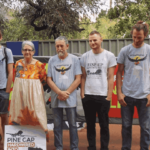The Racist Implications of the Age of Criminal Responsibility in Israel and Australia

Prior to their 11 day aerial assault upon Palestinian civilian populations in Gaza, Israeli authorities had come under international scrutiny for their detainment of five Palestinian children in March, as three of them were under the age of criminal responsibility, which is set at 12 years old.
Along with its other human rights abuses, apartheid Israel is well known for its annual detention of hundreds of Palestinian minors, often for the crime of throwing stones.
Unlike Israeli children, Palestinian kids are tried in military courts, and if they’re arrested in the occupied territories, they’re then transferred to prisons within Israel in breach of the Fourth Geneva Convention.
So, when Israel dropped the age of criminal responsibility from 14 to 12 within its own borders in 2016, concerns were raised as to how this would affect Palestinian kids living inside them.
However, for those living under military law in the occupied territories, they were already considered criminally responsible from the age of 12 onwards.
The racist implications of these Israeli laws are unsettling. But what’s perhaps more disturbing for people living here are the prejudicial implications of Australia having the age of criminal responsibility set at just 10 years old, along with the refusal of all jurisdictions to raise it so far.
Systemic racism
Australian authorities are notorious for disproportionately locking up the First Nations peoples of this continent to such a degree that they’ve become the most incarcerated people on the planet.
So, it’s little surprise that having the age of criminal responsibility set at as young as 10 is also having a devastating effect upon these populations, especially as Aboriginal and Torres Strait Islander kids account for 48 percent of those in youth detention.
Indeed, ABS figures relating to children sentenced to a custodial order in NSW, Queensland, South Australia and the Northern Territory over recent years are grim.
Over the financial year 2018-19, 149 First Nations children between 10 and 14 were sentenced to time in youth detention within these four jurisdictions, which compared with 31 of their non-Indigenous counterparts.
This meant 82 percent of 10 to 14 year olds sentenced to incarceration over those 12 months were Indigenous.
For 2019-20, 98 Aboriginal and Torres Strait Islander kids aged between 10 and 14 were sentenced to time in youth detention – or 84 percent of the total. This compared with just 18 non-Indigenous 10 to 14 year olds who the courts considered needed to be locked up.
Settler colonial dilemmas
There has been a sustained campaign over recent years to see the age of criminal responsibility lifted to 14 years old, as Australia lags behind most international nations in this regard. And the fact that the law mainly impacts Indigenous youth is well understood.
Despite this issue being on its agenda since 2018, the Council of Attorneys General announced in July last year that it had decided to postpone making the decision on whether to raise the age for at least another year, as, evidently, more work has to be done around how to deal with young offenders.
Law enforcement played a key role in the European takeover of the continent, and it continues to prejudicially target First Nations peoples.
Twenty nine percent of the adult prisoner population in this country is currently made up of Indigenous peoples, despite their accounting for less than 3 percent of the overall populace.
So, to consider the age of criminal responsibility being set at 10 years old being a remnant of the colonial project rings true, while the ongoing deliberations being made by the various attorneys general over raising the age is a sign that that project is far from over.







